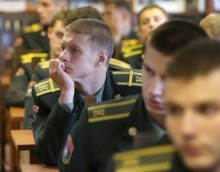On October 1 the National Academy of Security Service of Ukraine (NASSU) hosted the roundtable “The Role and Place of Special Services in the History of Ukrainian State” in Kyiv. A field day for researchers in the field. Among those who took place in the discussion were people who had stood by the cradle of the new state and its clandestine agencies, who had spent the years [of independence] studying the deep-reaching aspects of the history of these agencies, who also wrote it. Among those present were scholars from the Institute of the National Academy of Sciences of Ukraine, SBU ranking officers, and NASSU cadets – some 150 in all.
All were aware of the difficult times, of the unfriendly cold winds blowing before the winter, of history pushing each of them, hinting, reminding, guiding them in a certain direction. Some took the floor to share their ideas and memories, and what they said sounded in a new special context at a time when the idea of lustration was being actively introduced into society, although far from all communal members could fully comprehend it. It was interesting to trace back events in regard to the Ukrainian secret police at a turning point in national history, how the mentality of its officers and men, yesterday’s KGB men, started changing during the perestroika campaign when case files of persons purged under the totalitarian regime were declassified. Most of the officers who studied them could not help but realize what the KGB was actually all about, and this changed their mentality. [Former KGB General, ex-Prime Minister of Ukraine] Yevhen Marchuk brought up the subject during the roundtable. As he spoke one could only guess what was going on in the minds of the NASSU cadets. The young men were listening to a veteran and each was forming an opinion of his own. What lesson would they learn from what was happening outside the Academy as they sat at the roundtable? The fact remains that we hadn’t read all the files in the declassified cases that marked the tragedy of our parents and grandparents when we found ourselves faced with the current one.
The trouble is that we were swept under the tidal wave of Russia’s propaganda, packed with Soviet-style falsehood, even before we could figure out what was true and untrue in the Soviet version of our history, including the history of our clandestine agencies. So, this is a priority, and we have to both adequately elucidate historical facts and work out information counteroffensive formulas.
In the late 1980s, the vacuum of truth created during a generation’s lifetime [behind the Iron Curtain] exploded, bringing forth unprecedented history market demand as collections of declassified documents, dissidents’ writings, and fundamental research papers hit the shelves. However, good old yellow journalists were true to their good old windbag self and rode the wave-crest adding their trash to the shelves, all those loud pseudo-fiction titles, offering their simplistic views on problems and at times blatant lies about past realities. This stuff proved to be popular with people who wanted to read something interestingly unusual and then discuss it. Regrettably, true deep-reaching studies remained within the narrow intellectual quarters. Simplistic approaches were always preferred because they were so much easier to understand than the comprehensive scholarly ones. The bulk of the readers eventually adopted pseudo-theories permeated with Russian chauvinistic propaganda. It was thus Stalin started being eulogized, along with the ideas of Great or Soviet Russia/USSR. Once again the “Iron Felix” [Dzerzhinsky’s statue], returned to its plinth on Lubyanka Square, started talking to the masses from books written in a language they – especially those of the Homo Sovieticus species – could understand. We have ignored this process for 20 years, with declassified files collecting dust on Naukova Dumka Publishers’ shelves because the general public was not interested. By contrast, the Petrivka Flea Market in Kyiv is packed with thick paperbacks boasting portraits of totalitarian leaders, dictators, and tyrants.
We have allowed – and are still allowing – the aggressor to brainwash our people while this aggressor is banning our historical publications, as was the case with Yurii Shapoval’s book branded as extremist by Moscow. During the roundtable the author reiterated that the SBU is not a successor to the KGB. True enough, just as it is true that the same does not apply to Russia’s FSB. The KGB has always been there, as has its influence on Ukraine. In fact, current events show that a cherished dream of certain KGB functionaries has come true. Whereas under the Soviets the KGB and other clandestine agencies stood on the highest power ladder rung next to that of the Communist Party, in Putin’s Russia they have actually been given carte blanche. We, Ukrainians, are fighting not only Russian tanks, artillery, and mercenaries, but also the entire cynical system of Russian special services that have inherited all of the inhuman principles adhered to by their Soviet counterparts. We are falling prey to their provocations and acts of sabotage, falling into Kremlin-engineered traps. Ideological and information traps in the first place; traps concealed in school textbooks, pseudo-historical brochures, and television programs meant to instill in us false ideas and persuasions.
Our history boasts a unique personality, Ivan Mazepa. He was Hetman and at the same time a secret Cossack agent in Moscow. Reading his coded message sent across Europe through his agents is breathtaking. And to think that the head of a Ukrainian state could lead tyrants down the garden path at that distant period shrouded in mystery, speculations, intrigues, that he also anticipated events and knew how to use them! A true page-turner, complete with intelligence, counterintelligence, special operations, teams of saboteurs, the works. Sadly, little has been written on the subject, let alone page-turners. In fact, Pushkin’s biased version offers the best portrayal of Mazepa, a treacherous and shrewd character, Russia’s sworn enemy. Too bad, considering that we keep reading Russian paperback thrillers about the “valorous but severe NKVD” on Metro rides to work and back.
Roundtable participants offered interesting informative reports. Listening to them, I found myself thinking that the current tragic situation in Ukraine makes one look for historical parallels, yet bringing one back to harsh realities. A country that ought to have had an advanced national security system, even if due to its geographical position, suddenly found itself playing sacrificial lamb hoping to be saved by someone somewhere in this world. This state is spending millions on election campaigns while volunteers are supplying the army with flak jackets, even food. In this country people learn about the movements of Russian troops from fellow citizens calling risking their lives while the ATO functionaries refuse to see these movements caught by web cameras. We hear loud statements about lustration while they let characters who traded in our men’s deaths run for parliament. Only recently we had powerful state security structures, but a decade later they seemed to have vanished into thin air – or mutated. Focusing on Yanukovych’s four-year presidency (doubtlessly a disastrous term of office for the national clandestine agencies) does not suffice. There is evidence that the reasons behind this mutation lie deeper, to be found in the commercialization of the Security Service of Ukraine. At a certain point, before our very eyes, the huge SBU structure readjusted to meet the private interests of certain persons, taking part in political shootouts as a weapon in their hands, and national security be damned!
Eventually, as a natural consequence, SBU turned into a FSB affiliate. Before our very eyes SBU not just staggered but melted, evaporated. After surviving most complicated periods of transformations, with one epoch being replaced by the next, having worked out regeneration and crew-cleansing formulas, the SBU ship hit the reefs of the new era, an era of fierce enrichment.
I will not identify the persons who were on top of the reefs that pierced the hull of that ship. Their names are generally known. In fact, none of them has disappeared and some of them are still influencing the domestic situation. The main thing is that now, during this crucial period, in time of war, this ship is being rebuilt. SBU must be reborn with the new Ukrainian state, essentially, in terms of key mission, on terms and conditions understandable to the Ukrainian in the street. Among the cadets at the NASSU roundtable there must have been young men who did not realize that what the veterans were saying were words of advice prompted by history, that those words were spoken by men who had helped write rather than erase that history, that young blood would need that advice, perhaps several generations from now, to keep clean and dedicated. Yevhen Marchuk told them the main thing: “We need to value and protect people as the basis of the operative pyramid. The rest is miscellaneous.” Thus spoke the man who had laid the foundation of the Security Service of Ukraine. The cold unfriendly winds blowing outside the Academy seemed to add a special meaning to his message: We are all citizens of this country, we must serve as the basis of our national security.









